
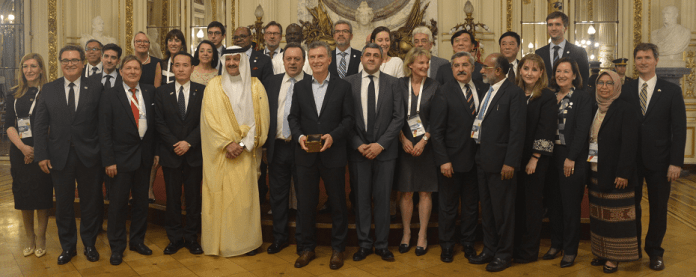
All star line up at WTTC 2018 Summit opening in Buenos Aires, Argentina
The global travel and tourism world is currently at the Hilton Hotel in Buenos Aires, Argentina.
The president of Argentina, H.E. Mauricio Marci personally attended the opening of the World Travel and Tourism Council Summit at the Hilton Hotel in Buenos Aires this morning. He explained the importance Argentina puts into tourism developments, he sees as a massive job creation tool for this South American Country.
The president welcomed the UNWTO initiative announced by UNWTO Secretary-General Zurab Pololikashvilia, to open a tourism innovation center in Argentina. Zurab said later during the opening it would be opened within two months.
The minister of tourism for Argentina H.E. Jose Gustavo Santos echoed the words of his president explaining the beauty and potential of Argentina as a tourism destination.
WTTC CEO Gloria Guevara Manzo reminded attending delegates of the largest travel and tourism corporations that this industry creates 330 million jobs in the world.

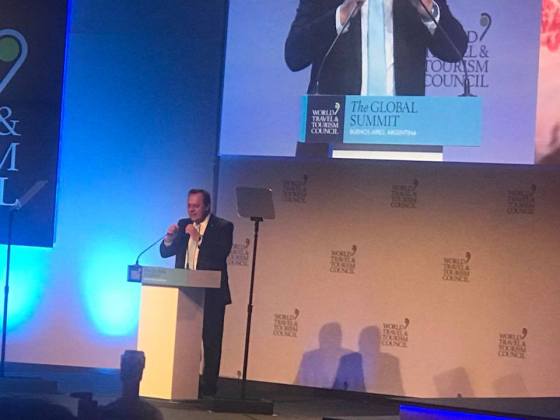

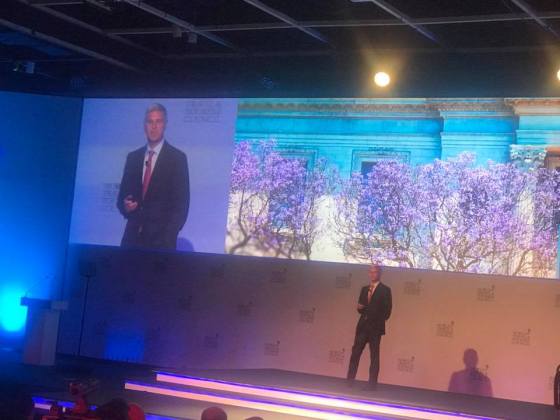
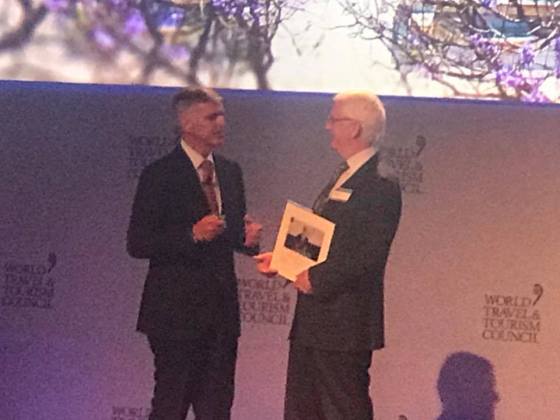
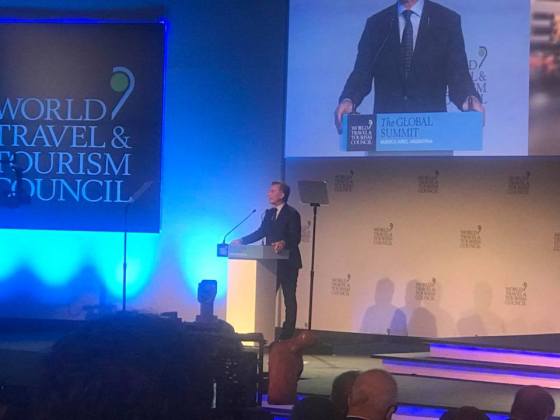 Christopher J. Bassetts, CEO of Hilton Hotels took over the chairman role for WTTC last night and thanked outgoing WTTC chairman G. Lawless.
Christopher J. Bassetts, CEO of Hilton Hotels took over the chairman role for WTTC last night and thanked outgoing WTTC chairman G. Lawless.
UNWTO Secretary-General Zurab Pololikashvilia welcomed ministers from several countries including Bulgaria, Saudi Arabia, Brazil, Kenya, Paraguay and reminded that tourism is an industry of peace and prosperity.
His appeal together with the WTTC CEO was: “Only together we make it better.”
Gloria Guevara Manzo said having competitors work together for the better of tourism is what WTTC is all about.

President Macri of Argentina: First WTTC World Leader for Travel & Tourism
President Maurico Macri of Argentina was today recognised by the World Travel & Tourism Council (WTTC) as its first World Leader for Travel & Tourism. The recognition was announced at the opening ceremony of the 2018 WTTC Global Summit which is taking place on 18 and 19 April in Buenos Aires, Argentina.
The WTTC World Leaders for Travel & Tourism initiative recognises serving Heads of State or Government who have shown exceptional support for the sector during their term of office, both within their own country and at the global level.
Since taking office in 2015, President Macri has championed the Travel & Tourism industry by transforming aviation, investing in infrastructure, and putting in place fiscal policies which support business growth and stability. In his speech to the World Economic Forum in January 2018, President Macri highlighted the economic potential for tourism in Argentina, particularly in the north of the country and where significant investment is planned.
In 2017 in Argentina there were a million more air passengers than in 2016, and hotel occupancies the highest ever. According to WTTC data, last year contribution from the Travel & Tourism sector to Argentina’s GDP grew one and a half times faster than the wider economy, showing how the focus on Travel & Tourism is bringing economic benefits and jobs across Argentina.
Gloria Guevara Manzo, President and CEO of WTTC, commented: “President Macri has demonstrated great commitment to the Travel & Tourism sector and we are proud to recognise the President as our first WTTC world Leader for Travel & Tourism. His clear message of Argentina being ‘open for business’ has benefited tourism enormously. President Macri has set the standard for best practice in global leadership within the Travel & Tourism industry as his policies have facilitated continuous growth and economic development within Argentina. Moreover, his leadership extends to the Presidency of the G20 and we thank him for his support for our sector in that forum. On behalf of WTTC and our members, thank you and congratulations.”

WTTC members investing $1.9 billion for Argentina tourism
Christopher J. Nassetta, Chairman, WTTC and President & CEO, Hilton, announced this morning the investment of $1.9 billion USD in Argentina by WTTC members over the coming years. The announcement was made in front of Mauricio Macri, Argentine President, and more than 100 industry-leading CEOs at the WTTC Annual General Meeting in Buenos Aires, Argentina.
“It’s an honour to be here in Argentina and, speaking on behalf of WTTC’s membership, we could not be more pleased to witness first-hand the benefits of the investment that’s happening here,” said Nassetta. “In total across the country, Travel & Tourism supports 1.8 million jobs today, and we expect to add another 300,000 jobs here over the next decade with our collective investment of nearly $2 billion an important driver of this growth.”
Policies implemented by Argentine President Macri have helped stabilise the economy and his clear message that, after many years of protectionist policies, Argentina is open for business is a positive move for tourism. The substantial investment is a testament to Argentine President Macri’s continued support and commitment to the Travel & Tourism sector.
During a summit among the Tourism Minsters of the G20 economies, yesterday, Argentine President Macri has asked to take his message of support to the G20 World Leaders’ meeting in November.
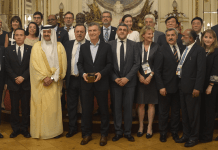
UNWTO joins Tourism Ministers in calling upon G20 Leaders to prioritize tourism
The World Tourism Organization (UNWTO) joined the Ministers of Tourism of the G20 economies meeting in Buenos Aires in calling upon the G20 leaders to consider including tourism in their Agenda for its capacity to create more and better jobs.
In his meeting with the President of Argentina, Mauricio Macri, and current G20 Chair, UNWTO Secretary-General, Zurab Pololikashvili, stressed the capacity of tourism to create jobs and the need to advance the adaptation of the sector to the digital transformation.
The 8th Meeting of the Tourism Ministers of the G20 economies was held in Buenos Aires on 17 April under Argentine’s Presidency of the G20 with a focus on the Future of Work – Tourism’s leading role in sustainable development: a driver for employment.
In line with the priorities of Argentine’s G20 Presidency, which include the ‘Future of Work’, the meeting focused on how tourism can embrace innovation and technology, foster new skills development to create new decent jobs.
“We need to promote the role that tourism has in shaping the future of our world as the sector that will create more jobs in the coming decade” said the Minister of Tourism of Argentina, Gustavo Santos, opening the Meeting.
Ambassador Daniel Raimondi, Vice Minister of Foreign Affairs and Worship of Argentina stressed the future of work as one of Argentine’s G20 priorities and it’s link to tourism, a sector which is key to create jobs, develop infrastructure and exports.
“Let us embrace the technological revolution and unleash its potential to create more and better jobs in our sector, making tourism a true pillar of the G20 objectives of inclusive and sustained growth” said UNWTO Secretary-General, Zurab Pololikashvili, in his opening remarks to the Meeting.
Ministers of Tourism of the G20 economies agreed on considering the following:
– Encouraging policies that promote full and productive employment and facilitate the progress of innovation in tourism and foster the creation of decent jobs, sustainable enterprises and entrepreneurship, in particular among women and the youth;
– Establishing favourable frameworks to stimulate innovation, entrepreneurship and connect ecosystems linking start-ups, main companies, investors and governments along the tourism value chain;
– Creating cooperation mechanisms between educational institutions at all levels, the private sector, governments and technology partners to review educational programmes and skills development policies
– Considering the importance of SMEs in the tourism, heritage and cultural sectors due to their contribution to job creation as well as their role in preserving and promoting cultural resources;
– Promoting the use of digital technology to facilitate travel as well as involving technology stakeholders in national tourism policies
In 2016, G20 countries received 904 million international tourist arrivals, which generated over US$ 1 trillion or 6.3% of all G20 exports.
The Government of Japan will host the 9th Meeting of the Tourism Ministers of the G20 economies in Kutchan Town, Hokkaido in 2019.
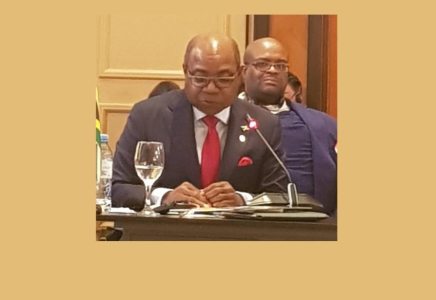
Jamaica Tourism Minister: Global mainstreaming of small and medium-sized tourism enterprises
The Minister of Tourism for Jamaica, Hon. Edmund Bartlett, CD, MP, is attending the World Travel & Tourism Council (WTTC) Global Summit 2018 in Buenos Aires, Argentina, which is set to begin tomorrow on April 18. Preceding the opening, he attended a T20 “Meeting of Tourism Ministers” at which he submitted a policy brief on Global mainstreaming of small and medium-sized tourism enterprises. The support received was overwhelming. Here eTurboNews shares the brief in full:
Background
This paper seeks to bring attention to an often under-discussed element of our tourism product- the importance of micro, small and medium-sized tourism enterprises (SMTEs) to the sustenance and vitality of the sector. The time has come for us to seriously revisit our strategies for supporting the expansion and improvement of this critical sector of the tourism market. We are well aware that one of the recurrent concerns among many Jamaicans is that the tourism sector does not sufficiently support sustainable development and that there is negligible reinvestment of tourism profits into the domestic economy.
While the benefits and positive contributions of the tourism sector are well-documented and self-evident, there is an emerging global view in many parts of the world that the tourism sector has not maximized its potential to fully contribute to sustainable development. This is due to heavy reliance on foreign imports within the sector, high rates of leakage, insufficient linkages with other segments of the economy and the belief that tourism revenues remain heavily concentrated within the country’s major hotels, especially through the expansion of the all-inclusive concept. I accept the general implications of these views and, through this paper, I am committed to changing this perception by placing greater emphasis on the role of small and medium-sized tourism enterprises (SMTEs) in promoting our tourism growth agenda.
For the purpose of this paper SMTEs can be defined as a collection of services and goods providers supporting the country’s tourism sector. A micro enterprise is defined as an enterprise having an annual turnover of less than US$100,000 with 1-3 employees. A small enterprise, on the other hand, is defined as an enterprise with an annual turnover between US$100,000 and US$500,000 with 4-10 employees while a medium-sized enterprise is an enterprise with an annual turnover between US$500,000 and US$2,000,000 with 11- 50 employees.
Contribution
SMTEs contribute invaluably to tourism development in Jamaica. Jamaica’s tourism sector is dominated by a vast network of small and medium-sized tourism enterprises (SMTEs) including: artisans and craft vendors, attractions and tours, transportation, beauty shops and textiles, duty-free stores, restaurants and eateries, bed and breakfasts, guest houses, farmers and distributors of hotel supplies. The vast network of SMTEs constitute the backbone of the sector, contributing significantly to the authenticity and quality of the tourism experience, enhancing destination competitiveness and contributing to enhanced brand image, the forging of positive local networks and increased productivity.
These enterprises are recognized as important drivers of economic growth and development in Jamaica by creating employment, facilitating wealth creation and forming the backbone for private sector growth and expansion. The activities of SMTEs also create a value chain within the communities and environs of their operations.
Community-based tourism enterprises (CBTEs), for example, pursue sustainable tourism and return economic, cultural, social and environment benefits to the communities in which they operate, either in whole or through joint ventures. They promote the local tourism value chain through linkages, where appropriate, to agriculture, arts and crafts, food service and related small businesses in the communities. Many are also involved in various forms of community outreach.
Many small enterprises in the accommodation sector are already involved in arrangements in which local farmers and community providers supply inputs for food and beverage, entertainment, furnishings and general hotel operations.
Globally, SMTEs account for most of the indirect jobs created through tourism-related activities. They generate employment, income opportunities and wealth by providing a wide array of oftentimes unique and authentic goods, services and experiences for visitors and by supplying many categories of good and services to hotels, especially during peak seasons, such as fruits and vegetables, meat and poultry, handicrafts, chemicals, other hotel supplies.
Cultural and heritage tourism
SMTEs are also the main drivers of cultural/heritage tourism. International tourism trends are pointing to a shift from the traditional ‘sun, sea and sand’ phenomenon towards interactive experiential tourism, one of tourism’s fastest growing sub-sectors, appealing to markets interested in gastronomy, nature, heritage and cultural experiences in the destinations they choose. SMTEs promote cultural/heritage tourism by assuring visitors of an authentic experience. They facilitate the consumption of indigenous cultures through the promotion of a wide range of activities such
as botanical gardens, marine and safari tours, adventure tours, waterfalls, caves, indigenous sites/villages, museums and galleries, archaeological sites, cabins and huts, local restaurants and live music experiences.
SMTEs facilitate unique gastronomic experiences and indulgence in authentic and vibrant folk forms, art and craft and musical heritage. They also stage appealing community festivals and events that showcase local cuisine and agriculture and the heritage of diverse ethnic, social and religious groups.
SMTEs and tourism growth agenda
As we move to fulfill our mandate to reposition tourism as the catalyst of job creation and inclusive growth for all, we believe that there is significant scope for the expansion of the SMTE sector which will allow for more average citizens to capitalize on the vast opportunities for supplying inputs to tourism entities catering to the visitor experience in areas such as accommodations, restaurants, cultural and creative enterprises, entertainment, attractions and tours, agriculture, manufacturing, foreign exchange trading, duty-free shopping and other services.
The involvement of small and medium-sized tourism enterprises (SMTEs) and community-based tourism enterprises (CBTEs) should be encouraged as much as possible. They should be encouraged to take advantage of the competitive strengths of small enterprises e.g. in meeting niche markets and specialized goods and services as exists in food and beverage and creative industries.
In many countries, the long-term structural issues of productive capacity and competitiveness of domestic industries require strategies to improve competitiveness such as identifying suitable niche markets, technology adaptation and innovations, compliance with international standards, reduction and control of production costs and improving marketing information and distribution networks (e.g. through inter-industry consultations, buyer-seller meetings, trade promotion events and expos).
A closer look at our strategic vision for the growth of the tourism sector over the next five years will reveal that the growth of SMTEs will support several of our key objectives such as: strengthening linkages with other sectors of the economy, particularly the agricultural and
manufacturing sectors; strengthening the benefits derived from the industry by local residents and communities; promoting broader participation by all Jamaicans; and ensuring the safety, security and sustainability of the natural and built environments.
Indeed our reinvigorated support for SMTEs is aligned with our broader thrust of strengthening current tourism linkages and identifying new areas of potential linkages with a view to maximizing the potential of the tourism sector for generating sustainable economic livelihoods for a larger number of locals, particularly those residing in communities in and around resort areas. In order for SMTEs to maximize their full potential, we recognize that they will need our help to build their capacities to meet the demands.
Strategies and initiatives
We have already identified the main challenges facing SMTEs such as: high level of informality, lack of commercial orientation, lack of market information and market access, insufficient access to capital for upgrading, limited customer training and low ICT diffusion. In Jamaica, the work of some of our agencies, particularly the Tourism Linkages Network has been helping SMTEs to overcome some of these challenges.
The Tourism Linkages Network for example continues to strengthen and encourage vibrant linkages through a number of initiatives focusing primarily on human capacity-building, assisting micro, small and medium-sized enterprises with their development, greater integration of local products and services into the tourism product and expanding the country’s potential to tap into new segments of the tourism market. This is evident in the establishment of five networks (Gastronomy, Sports & Entertainment, Health & Wellness, Knowledge and Shopping) to diversify the tourism product; to stimulate increased consumption of local goods; to stimulate entrepreneurship and employment; and to generate and retain more of the country’s tourism earnings. We have sought to improve the domestic credit environment for SMTEs through our 1 Billion JMD revolving loan scheme for tourism enterprises.
In 2016, we also initiated the National Community Tourism Portal. This portal has become an excellent marketing tool designed to help local community-based tourism enterprises (CBTEs) keep pace with the competition by: building awareness of community tourism in Jamaica;
providing comprehensive and engaging information on Jamaica’s community tourism product; providing an easy means for making community tourism bookings; and providing CBTEs with affordable and cost effective e-marketing services. The Tourism Product Development Company (TPDCo) also conducts tourism awareness activities and provides technical assistance on ecotourism, Bed & Breakfast (B&B), agro-tourism, cultural heritage tourism, and arts and crafts development projects.
The potential of the craft industry as a driver for growth in the earnings from tourism has long been acknowledged, in spite of its largely informal structure and other challenges to structured development. Five artisan villages are slated to be built across the island. They will be one-stop-shop facilities where visitors can see the creation and merchandising of craft items, while enjoying authentic Jamaican entertainment and leisure activities. It will also provide an avenue for Jamaican artists and craftsmen to expose and express their creativity by producing unique indigenous items, thus, limiting the volume of imported craft items that are being sold in the industry.
Conclusion
In closing, Jamaica’s experience demonstrates not only the importance of the SMTEs but also what mechanisms can be used to allow this sector to reach their full potential. Through this paper, we call for a more substantive focus on this sector as a means of achieving the United Nation’s Sustainable Development Goals (SDGs). We call for dialogue and a deeper engagement among stakeholders to develop strategies and policies to expand and possibly mainstream SMTEs. Through this forum, we call for a conversation between and among stakeholders to conceptualize, strategize and, to develop a blueprint that will provide guidance to SMTEs globally. Jamaica is in the process of organizing a summit on SMTEs and the SDGs. We will provide you with some more details on this event in the coming weeks.
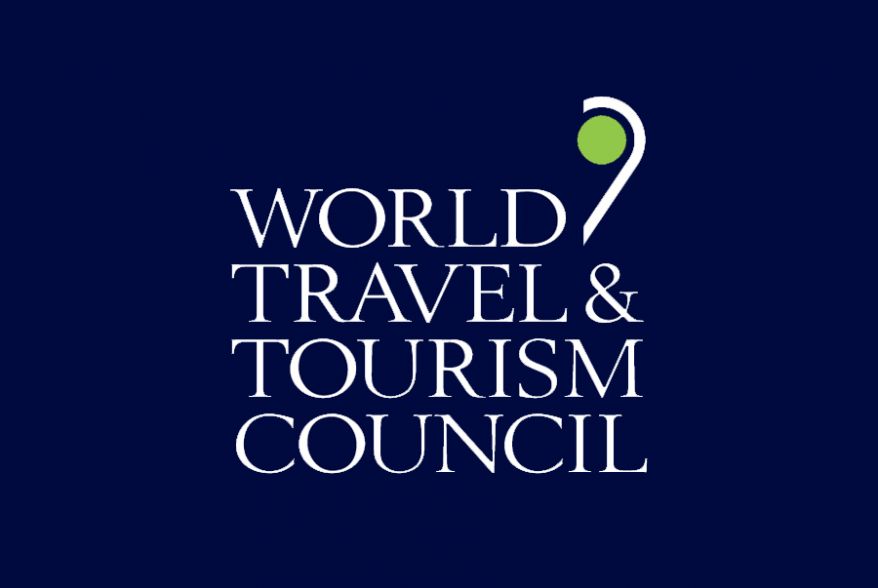
WTTC calls for government and industry partnership in response to Caribbean recovery
The WTTC Summit is about to start in Buenos Aires, Argentinas. Delegates from around the globe are checking into the Hilton Buenos Aires Hotel for this important global event of tourism leaders.
WTTC is setting the stage and issued this release today:
In response to the impact of the 2017 hurricane season on the Caribbean’s Travel & Tourism sector, the World Travel & Tourism Council (WTTC) has launched a report on Resilience and Recovery assessing the immediate and long-term effect across the region.
Analysis from Tourism Economics, an Oxford Economics subsidiary, found that Travel & Tourism is one of the most important economic sectors in the Caribbean, contributing 15.2% of the Caribbean’s GDP and 13.8% of employment. However, in around half of the countries analysed, the sector accounts for over 25% of GDP – more than double the world average of 10.4%.
The 46.7 million international visitors who visited the region in 2016 spent US$31.4 billion, which supported 2.4 million jobs. The 2017 hurricane season resulted in an estimated loss of of 826,100 visitors to the Caribbean, compared to pre-hurricane forecasts. These visitors would have generated US$741 million and supported 11,005 jobs. Research suggests that recovery to previous levels could take up to four years, resulting in an approximate loss of US$3 billion.
Quantifying the impact on Travel & Tourism post-crisis provides a level of understanding of the enormous economic contribution that the sector brings to the region and the impetus for recovery. Natural disasters will continue to hit the Caribbean, perhaps on an increasingly frequent basis as a result of climate change. As the economies of islands grow ever more reliant on the sector, it is critical that governments and destination management organisations develop strategies to minimise the long-term impact of natural disasters and encourage visitor spending to return to pre-hurricane levels of growth.
Gloria Guevara Manzo, President and CEO WTTC, commented: “Crisis preparedness and response is one of WTTC’s strategic priorities. We are delighted to present this research which helps the tourism industry, both public and private sectors, in the Caribbean quantify the potential impact of the devastating hurricanes last year and put in place partnerships and policies to help bring the region, and those islands most negatively affected, back on track.
Timeframes for recovery can be significantly reduced when governments work alongside the private sector to implement policy initiatives that are supportive for Travel & Tourism growth and long-term resilience. WTTC strongly encourages these conversations and together with our Members, we are working hard to support local communities as they rebuild and recover and ensure resilience against future crises.
Frank J. Comito, CEO and Director General, Caribbean Hotel and Tourism Association, commented: “In the autumn of 2017 the world watched on in shock at the media images of the strongest Atlantic hurricanes ever observed battering the islands of the Caribbean, one of the most tourism-dependent regions in the world. The need to demonstrate unity and leadership is especially critical in times of crisis. Actions need to be taken quickly in order to ensure a rapid recovery to those affected by natural disasters and to restore public confidence in Travel & Tourism.”
Joy Jibrilu, Chairperson, Chairman, Board of Directors, Caribbean Tourism Organization and Director General, Bahamas Ministry of Tourism, commented: “The events of last fall were tragic for so many across our Caribbean region, and our thoughts are still very much with the countries, businesses and families that are rebuilding their lives now. The best, most effective way to support this endeavour is for all of us to work together. This partnership must bring together public and private entities in our countries and region, and we must also be mindful that the progress of one country will tend to benefit our marketplace position as a region.”
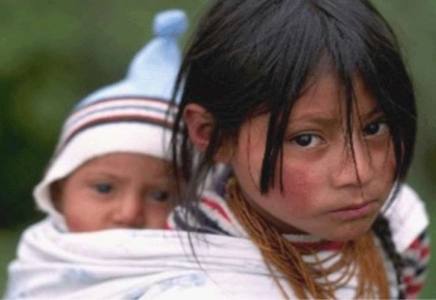
Why responsible tourists should visit Honduras, El Salvador, Dominican Republic and Guatemala
Responsible tourists should look to travel to and support Honduras, El Salvador, Dominican Republic and Guatemala through tourism. Responsible tourists should check carefully when supporting other Caribbean and Latin American Countries. This message becomes timely with the start of the WTTC (World Travel and Tourism Summit) about to start in Buenos Aires, Argentina.
Except for Honduras, El Salvador, Dominican Republic and Guatemala, other Latin American and Caribbean countries are struggling to make progress against child marriage compared with countries in South Asia, according to a UNICEF report.
While other parts of the world have reduced the incidence of child marriage, “this has not been the case in our region, where one out of four women are being married before 18 years old,” says local UNICEF head Maria Cristina Perceval.
Latin America and the Caribbean has become the only region in the world where child marriages have not decreased significantly over the past decade, according to a recent report by the U.N. children’s agency (UNICEF).
“We are observing a real progress in other parts of the world to protect girls from child marriage,” stated in Panama City Maria Cristina Perceval, chief of Unicef for Latin America and the Caribbean. “However, this has not been the case in our region, where one out of four women are being married before 18 years old.”
As a result, these girls do not benefit from the same life opportunities in the medium and long term, with a higher risk of sexual violence, early pregnancies, dropping off school, in addition with the social exclusion from their peers, added Perceval.
Only four countries in the region have banned child marriage, with Honduras, El Salvador, Dominican Republic and Guatemala.
In February, another Unicef report warned that there had been insufficient progress in reducing high teenage pregnancy rates in Latin America and the Caribbean: although overall teenage pregnancy rates “dropped slightly” over the past three decades, the region has the second-highest rate globally.
The total number of girls married in childhood stands at 12 million per year and without public policies properly addressing the issue, more than 150 million additional girls will marry before their 18th birthday by 2030, found the report.
Globally, about one in six adolescent girls (aged 15 to 19) are currently married or in a union. West and Central Africa has the highest proportion of married adolescents (27 percent), followed by Eastern and Southern Africa (20 percent) and the Middle East and North Africa (13 percent). Latin America ranks fourth with 11 percent of the total of adolescent girls.
According to UNICEF, child marriages and early unions in the region are associated with the high rate of teenage pregnancies, the second in the world, and the risk of sexual violence, in addition to gender inequality.
Factors to which join many others such as poverty, social norms, gender roles and relationships, beliefs and gaps in national legislation.
‘In the region, the equality of girls is limited by the impact of early motherhood, violence and limited life opportunities. We cannot keep our eyes closed to a lost potential and forgotten rights ‘, hence the urgent call to put an end to these practices said Perceval.

New law to protect children
In a huge win for victims of online sex trafficking, FOSTA-SESTA was signed into law by the President this week. Backpage, an online marketplace notorious for trafficking children, has now been seized by the U.S. Department of Justice.
The new law will allow victims of human trafficking to sue websites that knowingly assisted in the crime and will give prosecutors a new tool to criminally go after these websites.
On the backpage website, a notice has been posted by the US Department of Justice:
backpage.com and affiliated websites have been seized
as part of an enforcement action by the Federal Bureau of Investigation, the U.S. Postal Inspection Service, and the Internal Revenue Service Criminal Investigation Division, with analytical assistance from the Joint Regional Intelligence Center.
Other agencies particpating in and supporting the enforcement and action include the U.S. Attorney’s Office for the District of Arizona, the U.S. Department of Justice’s Child Exploitation and Obscenity Section, the U.S. Attorney’s Office for the Central District of California, the office of the California Attorney General, and the office of the Texas Attorrney General.
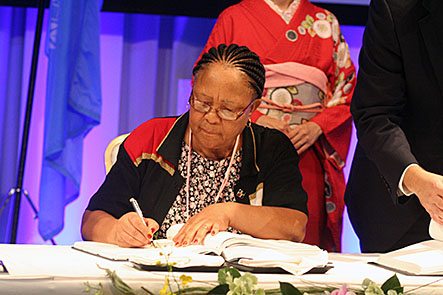
Farewell to former Lesotho Minister of Tourism
The Honorable Mamahele Radebe, former Minister of Tourism for Lesotho, passed away on Saturday, March 31, 2018, after a long illness.
Thato Mohasoa, who served as Principal Secretary for the Ministry of Tourism Environment and Culture, under the Honorable Minister Mamahele Radebe wrote this tribute in his personal capacity.
We lost Honorable Mamahele Radebe on Saturday, 31st March 2018, after some long illness. We already miss her kind presence and reassuring voice, and if we were to choose, she would still be with us, in good health, here on mother earth.
In her life, this great granddaughter of Chief Lethole of the Makhoakoa (as she affectionately referred to herself), she would see her share of hardship, struggle, uncertainty, lack of offspring of her own, and a loss of a husband to a tragic death. Yet out of those circumstances came a steady, calm and cheerful confidence that life would bring good things. This was the backdrop from which she led her life of principle, compassion, pragmatism, and enormous professional success.
As soon as she retired from an illustrious civil service career, as head of Lesotho’s postal services, she took an active part in Lesotho’s politics, heading north to her home constituency of Hololo, to stand in the elections as a candidate for the All Basotho Convention (ABC). Her moment as Minister of Tourism Environment and Culture arrived in 2012, following the formation of Lesotho’s first Coalition Government. It is in this capacity that both of us came to work together and forged a strong lifetime bond.
As she showed what a minister should be, she also showed us what a human being should be. She carried herself with a decency, attention to small kindnesses, and insatiable humor that also defined a good life. A relationship between a Minister and a Principal Secretary is not easy to manage. These are two people, each endowed with a heavy dose of power. A minister has responsibility to exercise general direction and control over the ministry, while the Principal Secretary is exclusively empowered to provide control and direction over all resources – human and capital. It can, has been, and continues to date, to be a source of deep strive between these two centers of power. It is not a place for blind power mongers. It is a relationship that calls for mutual respect, mutual trust, cooperation, and civility. Our minister had all these qualities. She referred to all of us in the ministry, from myself as her chief advisor, and to all staff, as her colleagues, and treated us as such. But she was much more than that; she was a leader, a counsellor, a mother, and a friend. I learned a lot more from her on the mechanics of the civil service, and on public policy, including on how to navigate the throttling government bureaucracy to get work done, than from anyone I have worked with.
The first Coalition Government established the “Job Summit,” a platform through which government would catalyze job creation and investment promotion. The tourism sector was identified as one of the key pillars of this policy ambition, and we were directed to actualize it. In response, the minister hit the ground running by championing a number of initiatives, which were geared towards repositioning this sector. In the end, among other things, a number of government-owned facilities, which had, hitherto, been rendered as white elephants, were divested to the private sector, through the development of rapid public-private partnership transactions, resulting in increased capital investment, increased employment of Basotho, as well as an upsurge in the number of tourists coming into Lesotho.
Our minister represented our country with dignity on the world stage, and forged meaningful and mutually-beneficial relations on its behalf. Some of us cannot forget her charm that led to the signing of a Memorandum of Understanding between Our Ministry and South-Africa’s Provinces of Kwazulu-Natal and Free-State, on Joint Cooperation on the Cableway Project, on the north-east of the country, along the Drakensberg. In our meeting with the South-African tourism officials, she argued that the coming to life of the project, while it would promote tourism and strengthen trade between the two countries, it would also, in her words, “continue to accessorize our relationship,” citing the successful inscription of the Sehlaba-Thebe National Park, as a world heritage site – a commendable work heavily supported by South-Africa -, as a case in point for continued collaboration.
She fought hard to ensure that Lesotho’s voice was always heard in international platforms. The unfortunate truth about international relations is that it is always biased towards the bigger states. Our minister would not just stand by and accept this as a norm. She was a lead voice for the restructuring of the Regional Tourism Organization of Southern-Africa (RETOSA), and successfully fought against what was manifesting as an oligarchy in charting the region’s tourism agenda. She also strongly advocated for the establishment of an office within the SADC Secretariat which would be dedicated to the Arts and Craft sector, arguing that this sector, as part of the global creative economy, has seen consistent growth and shown capacity to forge even stronger links with the tourism sector in the region.
She fretted over a lack of proper and coordinated management of the environment in Lesotho and longed for the day this matter could be urgently attended to, as a collective government priority. In line with this vision, she made it her mission to personally submit Lesotho’s request before the Executive Director of the United Nations Environment Program (UNEP), to help set up an Environmental Management Agency, a body to be tasked with responsibility for ensuring sustainable management of natural resources, protection of the environment, and for promulgating sound policies and practices.
She was an imperfect politician, for while politics can be divisive and partisan, she made it her habit to reach out to opponents, as and when it was necessary to do so. She would find it effortless to befriend Keketso Rants’o, then of the Lesotho Congress for Democracy (LCD); to request LCD colleague to stand in for her as Minister of Tourism while she was off duty, or for that matter to sit down with her successor, a member of the Democratic Congress (DC) and decently provide guidance, as part of hand over. This is a person who would not shy to complain during Parliament’s recess that she missed watching “Qoo’s antics” in parliament. She was in short, not mean-spirited.
Our minister was benevolent and altruistic. I cannot recall the number of members of her family and of community that she was taking care of; it would be a sick relative, needy members of the community looking for clothing, food or shelter, a member of the party, a rural school, or a church in need. She always found a way around intervening for them. When a staff member was bereaved, she would be the first one to arrive at the home to offer condolences, or if she is far away, she would not hesitate to commiserate by phone, while apologizing for not being there in person. When our National Library team informed her of a plan to donate a “mobile home” to the Maseru Central Prison, for use as classrooms by inmates, she got excited and instructed, “Give them books and stationery as well.”
Our boss had a great sense of humor and possessed ability to laugh out loud into the horizon. When I arrived to help her settle her overrun hotel bill in Vienna, Austria, she joked that I nearly found her already washing dishes in the hotel kitchen, as settlement, quipping, “Here they make you pay even for a sachet of sugar.” For many times she recounted how unfairly she was removed from the Board of the Post Bank, after discovering that she had joined the opposition ABC. The story centers around this particular Board Meeting in which she forgot to put her phone on silence. During the proceedings, her phone rang, and unfortunately for her, in the house full of LCD supporters, her ring tone was an ABC praise-song, which belted out, urging Thabane to take over Mosisili’s government! The house went silent while she frantically reached out to silence the goddam phone. The following day she received a letter of dismissal from the Board. Her typical reaction; she took the letter, looked at it, laughed at it all the way to Hololo where she was going to register to stand as ABC candidate in a by-election in that constituency. The rest, as they say, is history.
We have been missing her for a while now due to ill health, and now death, but her magical effect on the lives of the many of us shall remain for eternity. While we are saddened by her passing on, we draw strength from the Holy Bible (Revelations 21:4) that, “… God shall wipe away all tears from their eyes; and there shall be no more death, neither sorrow, nor crying, neither shall there be any more pain: for the former things are passed away.” We take these words to be true and are comforted that she is out of pain and home safe now with her husband, in heaven.

Brazil has a new Minister of Tourism
Vinicius Lummertz has become the new Minister of Tourism in Brazil.
Previously President of the Brazilian Tourism Board’s – EMBRATUR, Mr. Lummertz takes the position today, April 10, following on from Mr. Marx Beltrão.
Vinicius Lummertz holds a bachelor’s degree in Political Science from the American University of Paris, a postgraduate degree from Harvard University’s Kennedy School, in the IMD of Lausanne, Switzerland, and an Executive MBA from Amana Key in São Paulo.
Lummertz takes on the responsibility of continuing the process of modernizing the sector, reducing bureaucracy and boosting tourism as a strategic activity for the country’s economic growth.
The new chairman of Embratur will be announced in the next days.
